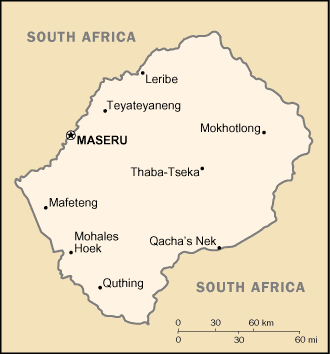Welcome to the Virtual Education Wiki ~ Open Education Wiki
Lesotho
Experts situated in Lesotho
Moliehi Sekese
Lesotho in a nutshell
(sourced from http://en.wikipedia.org/wiki/Lesotho)

Lesotho, officially the Kingdom of Lesotho, is a landlocked country and enclave — entirely surrounded by the Republic of South Africa. Its size is just over 30,000 km².
Lesotho has an estimated population of almost 1,800,000.
Its capital is Maseru.
It is the southernmost landlocked country in the world. It is a member of the Commonwealth of Nations.
The name Lesotho translates roughly into "the land of the people who speak Sesotho".
About 40% of the population live below the international poverty line of US$1.25 a day.
Education in Lesotho
(sourced from http://en.wikipedia.org/wiki/Education_in_Lesotho)
Education in Lesotho is not compulsory or free. In 1996, the gross primary enrollment rate was 107.7 percent, while the net primary enrollment rate was 69.9 percent, with higher rates for girls than boys. Many young boys involved in herding forgo even the most basic levels of primary education.
Schools in Lesotho
Further and Higher education
Universities in Lesotho
The National University of Lesotho is situated at Roma (pop.8,000) some 34 kilometers south-east of Maseru, the capital of Lesotho. The Roma valley is broad and is surrounded by a barrier of rugged mountains which provides magnificent scenery. The University enjoys a temperate climate with four distinctive seasons.
The governing body of the University is the Council and academic policy is in the hands of Senate - both Council and Senate being established by the Act. The University holds membership in:
- Association of Commonwealth Universities
- Association of African Universities
- International Association of Universities
- Southern African Regional Universities Association
The National University of Lesotho's history goes back to 1945, when a Catholic University College was founded at Roma by the Roman Catholic Hierarchy of Southern Africa. The establishment of this College was a realisation of a decision taken in 1938 by the Synod of Catholic Bishops in South Africa to provide African Catholic students with post-matriculation and religious guidance. The Catholic University College was founded in an isolated valley 34 kilometers from Maseru in a temporary primary school building at Roma Mission.